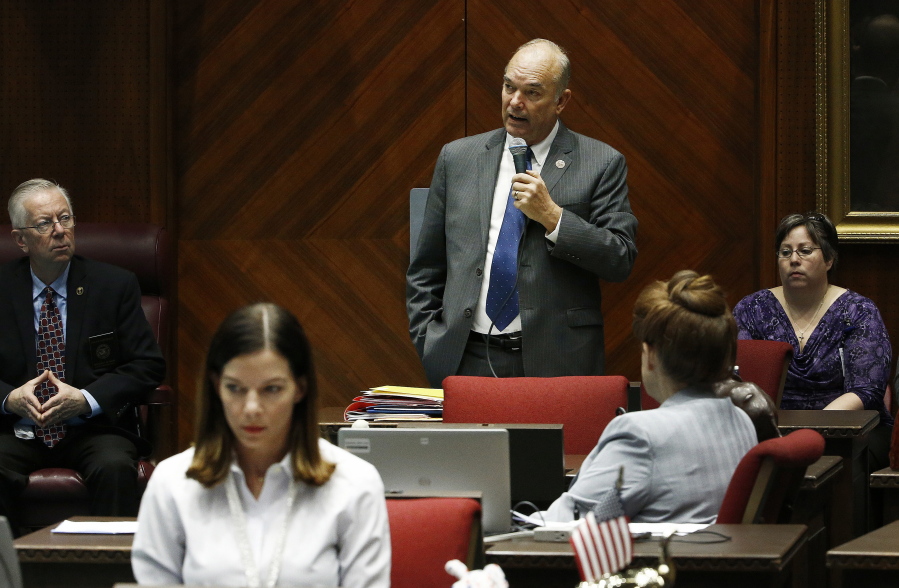JEFFERSON CITY, Mo. — After a tumultuous few months that saw numerous lawmakers accused of sexual misconduct, a majority of state legislatures across the country are considering strengthening sexual harassment policies that have gone unheeded or unchanged for years.
A 50-state review by The Associated Press found that almost all legislative chambers now have at least some type of written sexual harassment policy, though they vary widely, and many are placing a greater emphasis on preventing and punishing sexual misconduct as they convene for their 2018 sessions.
This week alone, lawmakers in Arizona, Idaho, Tennessee and Rhode Island underwent detailed training about sexual harassment, some for the first time. And a Florida Senate panel voted to mandate an hourlong course.
Yet about a third of all legislative chambers do not require lawmakers to receive training about what constitutes sexual harassment, how to report it and what consequences it carries, the AP’s review found.
The AP also found that only a minority of legislative bodies conduct external investigations into complaints, with most others entrusting lawmakers or staff to look into allegations against colleagues. That has contributed to a culture in some capitols in which the targets of sexual harassment have been reluctant to come forward with complaints — until recently.
Lawmakers around the country have said it’s now time to take concrete steps to change that culture.
“Let’s treat all women — regardless of their background, their age, their political affiliation, their role in the process — as ladies, as we would like anybody to treat our wives, our daughters, mothers, sisters,” said J.D. Mesnard, the Republican who heads the Arizona state House, where lawmakers took part in mandated sexual harassment training this week.
A wave of sexual misconduct claims against prominent figures in entertainment, media and politics gained momentum last fall after a multitude of women made allegations against movie producer Harvey Weinstein.
In the past year, at least 14 legislators in 10 states have resigned from office following accusations of sexual harassment or misconduct, according to the AP’s review. At least 16 others in more than a dozen states have faced other repercussions, such as the voluntary or forced removal from legislative leadership positions. Some others remain defiant in the face of ongoing investigations into sexual harassment complaints.
The AP found that more than three-fourths of the states have at least one legislative chamber that has updated its sexual harassment policy during the past several months, developed specific proposals to do so or undertaken a review of whether changes are needed.
In Washington state, more than 40 lawmakers joined scores of other women in a November letter calling for a change in the capitol culture. They wrote it has “too often functioned to serve and support harassers’ power and privilege over protection of those who work for them.”
A Senate panel subsequently approved annual training for senators and staff, and both chambers now are reviewing their policies.
The Arizona House had no written sexual harassment policy until November, when Mesnard issued one after a female lawmaker accused a male colleague of sexually harassing her. In the weeks that followed, several other women came forward with stories of crude behavior by state Rep. Don Shooter.
On Tuesday, at the start of mandatory sexual harassment training, Shooter stood before colleagues and apologized for conduct he called “jarring, insensitive and demeaning.” But he denied the most serious complaint — that he tried to pressure Rep. Michelle Ugenti-Rita into a sexual relationship.
Ugenti-Rita was sitting just three rows in front of Shooter and appeared shaken at times as he spoke.
In Kentucky, the acting House speaker has appointed a committee to devise a formal system to address workplace complaints. That comes after former Speaker Jeff Hoover resigned his leadership post following revelations that he had paid to keep a sexual harassment settlement secret. Three other lawmakers who signed the secret settlement were removed as chairmen of various committees.
Legislative chambers in Alaska, California, Colorado, Minnesota, Nevada and Ohio are among the states considering improved policies on sexual harassment — in each case as sexual harassment claims were brought to light.
Among states that require sexual harassment training for lawmakers, the frequency varies greatly. Some offer it annually or every other year, while others require it only once, when a lawmaker is first elected.



